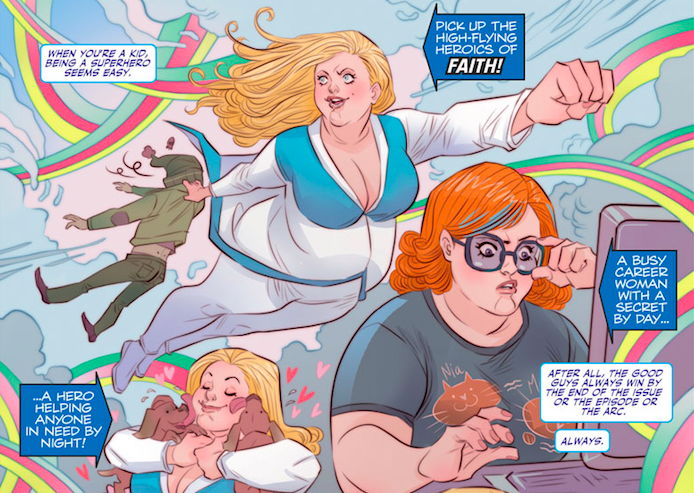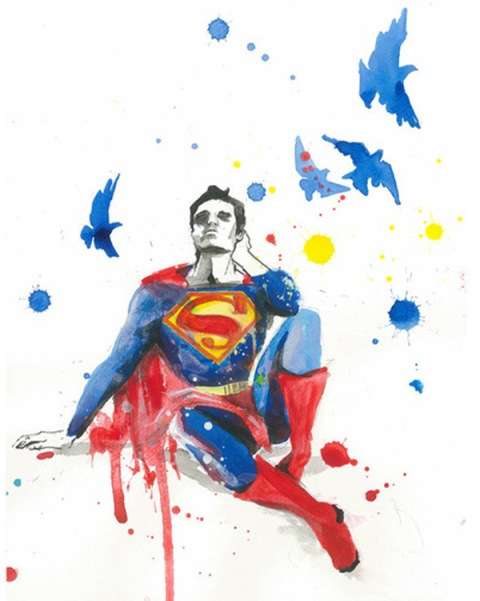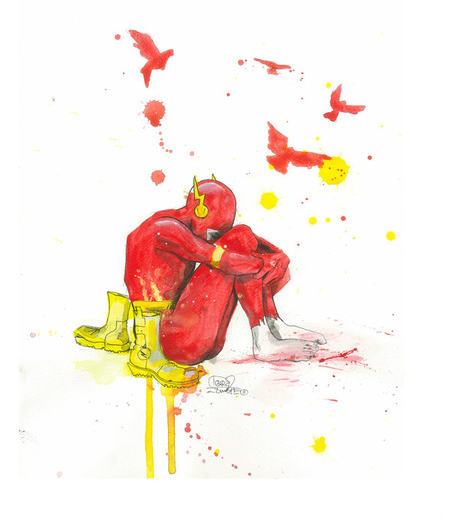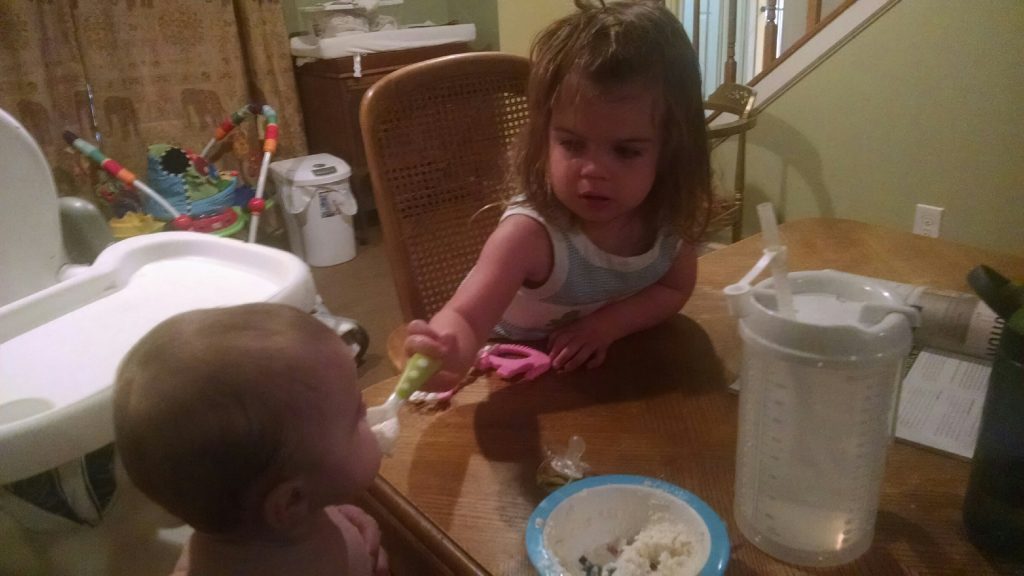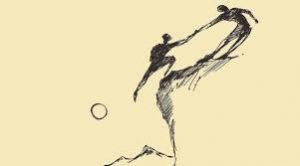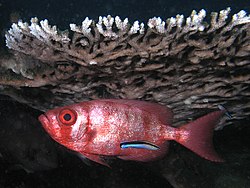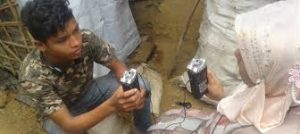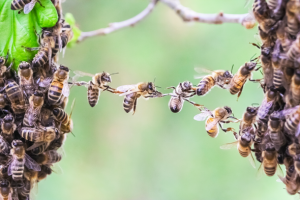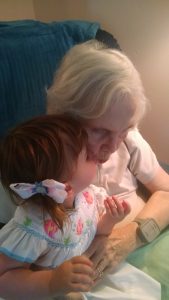And who isn’t, these days? But a pandemic isn’t the only trigger for defense mechanisms. For example, the death of a loved one, loss of a job, life-threatening illness, relocation, demotion . . . the possibilities are endless. So, for you reading pleasure and maybe your writing of believable characters, here’s a quick overview of ways people cope with thoughts, feelings, or acts that are too psychologically painful to tolerate.

Acting Out
Performing an extreme behavior when a person cannot otherwise express thoughts or feelings. A child’s temper tantrum would be one example. Hurting oneself is one form of acting out—cutting or burning oneself, literally banging one’s head against a wall.

Aim Inhibition
Rather than admit to failure, a person accepts a more modest goal. Think of someone who had hopes for a career in the NFL who becomes a high school coach.
If he can’t be the Flash, at least he can be Whizzer!
.
.
.

Altruism
Rather than admit having no control over a situation, a person copes by helping others, perhaps compulsively. This is a person who needs to be needed and may promote helplessness in those close to him/her.
The Angel had such a strong compulsion to help everyone that Dr. Charles Xavier of the X-Men diagnosed him with “heropathy” (not an actual disease).
.

Avoidance
Refusing to deal with the situation. In the current pandemic, choosing not to watch the news, read the newspapers, or respond to online postings.
Deadpool has been using running and laughing to avoid his horrible life situations since he was a child.
.

Compartmentalization
Keeping different parts of one’s life in separate compartments, often with different moral guidelines. For example, someone who lies, cheats, steals, or hurts others to make a living but is unfailingly kind, helpful, and loyal to family and loved ones. Another example would be someone who enjoys extramarital sex but would never have “an affair” because that involves emotional intimacy and thus would be “cheating.”
Matt Murdock is a blind defense lawyer by day and the superhuman illegal vigilante Daredevil by night.

Compensation
Overachievement in one area because of failure in another. For example, throwing oneself into professional achievement because of failure of a marriage or intimate relationships. Or the opposite: not making it professionally and then becoming a helicopter parent.
Hartley Rathaway was born deaf and became obsessed with sound manipulation, eventually becoming the Pied Piper.
.

Denial
Basically, this is saying it isn’t so. “There is no pandemic. It’s all a hoax—or an exaggeration.” “It isn’t that dangerous.” Addicts often deny that they have a problem.

Displacement
Taking out frustrations, feelings, or impulses on people or objects that are less threatening. It usually applies to displaced aggression. The classic example is the boss criticizes the employee, the employee yells at his/her spouse, the spouse scolds the child, and the child kicks the dog. Of course, the person might just abuse the child or pet. Or one might smash a fist into the wall or break something.
Reed Richards “Mr. Fantastic” frequently expressed his frustrations with the world by beating his wife and children. This panel occurred immediately after such an outbreak.

Dissociation
Mentally separating oneself from one’s body or environment in order to keep an overwhelming experience at a distance. An example would be someone unhappy with his/her job has trouble concentrating at work, frequently “daydream” or finding his/her mind wandering.
Trance used her astral projection ability to escape the demonic Limbo pocket dimension and get help.

Fantasy
Retreating to a safe place in one’s mind. If one can’t find relief in fantasizing about being turned into a movie star or whatever, you can get much the same effect by binge reading or tv watching or gaming.
Michael Jon Carter hated his life in the 25th century, so he traveled back in time with stolen gadgets to live out a fantasy life as the superhero Booster Gold in the 20th century.
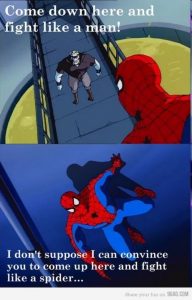
Humor
Seeing the funny or ironic side of any situation. This is actually a pretty adaptive way to handle stress and anxiety. For example, wearing a face mask with giant mustache attached or creating silly photo shoots of pets in quarantine.
Spiderman is a master of using bad jokes to torture his enemies.
.
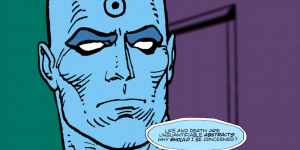
Dr. Manhattan is so brilliant that he loses all touch with humanity.
Intellectualization
Focusing on the problem/problematic thoughts in a cold, factual way. For example, putting the current pandemic into the context of pandemics through the ages, how devastating they were, how they were transmitted, how they were dealt with, etc.

Passive Aggression
This is often the refuge for someone who can’t express anger or aggression directly (by scolding, hitting, etc.). For example, a teenager who is assigned a chore, such as mopping the kitchen floor, who begins by asking a gazillion questions about where to find and how to use the necessary equipment, then doesn’t sweep before starting, then mopping around the table rather than under it, and finally leaving soap scum behind.
Emma Frost generally straddles the line between passive-aggressive and aggressive-aggressive, depending on her allies.

Projection
Ascribing one’s unacceptable qualities, thoughts, or feelings to others. Think Donald Trump accusing reporters of being rude.
Harley Quinn projected her brainwashing and Stockholm Syndrome onto Flash and tried to “cure” him.

Rationalization
Basically, this is making excuses. You did it, you aren’t denying that you did it, but you give rational or logical reasons for it. What makes this a defense mechanism is that the stated/acknowledged reason isn’t the real motivation. For example, you pawned your mother’s wedding and engagement rings and claim you needed the money when you really wanted to hurt her—or you hated your dead father and don’t want the reminder around.
Gin Genie can create seismic shock waves in direct relation to the amount of alcohol in her system. To be a powerful superhero, she also has to be an abusive alcoholic.

Reaction Formation
Replacing an unacceptable feeling, impulse, or behavior with the opposite. For example, subconsciously wishing a sibling would fail and so going out of one’s way to be helpful and promote success — the perfect fan.

Regression
A person reverts to a pattern of behavior that worked when one was younger. Think thumb-sucking, crying, sulking, or temper tantrums.
Zatanna feels such guilt over using her powers to erase the memories of her enemies and friends that her powers revert to a level she had when younger.
.

Repression
I like to think of this as motivated forgetting. Things that are too painful are kept out of consciousness awareness, but may have a powerful effect on behavior. For example, a victim of early childhood sexual abuse who doesn’t remember the event(s) but has difficulty becoming intimate.
Jessica Jones has years of repressed memories thanks to brainwashing and mind control.

Suppression
Much like repression, but one consciously decides not to think about or remember something. This is fairly tough to pull off! Every time it comes to consciousness, one distracts oneself with something else. One example: having an obsessive thought running through one’s head is a way to block other scarier or more stressful thoughts from surfacing.
The Red Room training forced Natasha Romanoff to remove all empathy and mercy and become the Black Widow. She had to retrain herself to join the Avengers.

Sublimation
Act out unacceptable impulses by transforming them into a more acceptable form. For example, aggressive impulses channeled into martial arts. Someone who likes looking at naked bodies takes up figure drawing.
Batman has turned the anger and grief from watching his parents’ murder into a drive to fight crime.

Undoing
Closely related to Reaction Formation but usually on a more conscious level; trying to make up for unacceptable thoughts, feelings, or behaviors — sort of like an unstated apology. For example, a child who is jealous of a younger sibling and wishes s/he were dead might make a point of giving that sibling toys, one’s cookie, etc.
Tomorrow Woman is an android created to destroy the Justice League. She achieves artificial consciousness and sacrifices herself to destroy her creators instead.
BOTTOM LINES FOR WRITERS: Everyone uses defense mechanisms. It’s how we cope. Choose defense mechanisms for your characters that are in line with his/her character in general. So, for example, a scientist is unlikely to use denial and more likely to use intellectualization.
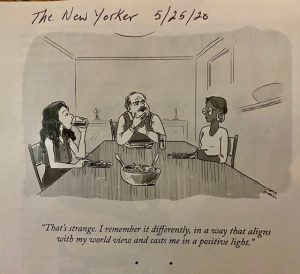
Although using defense mechanisms is natural, normal, and helpful on an episodic or “acute” basis, long-term or “chronic” use can lead to emotional problems because the underlying threat or anxiety is never actually addressed.
